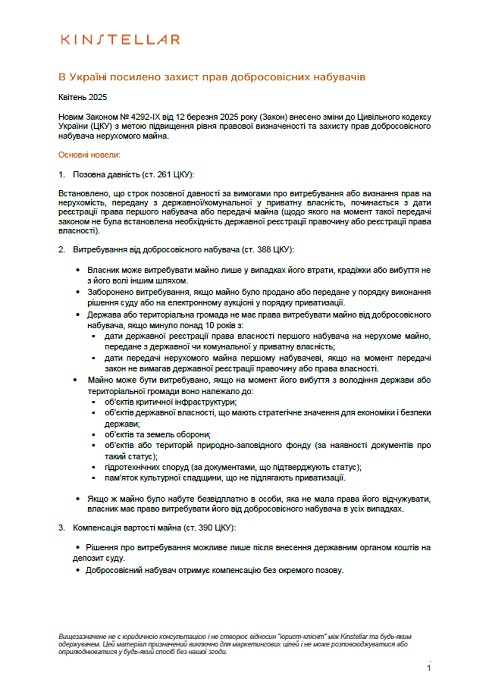- within Real Estate and Construction topic(s)
- within Immigration, Technology and Corporate/Commercial Law topic(s)
April 2025 – A new law, No. 4292-IX, dated March 12, 2025 (the "Law"), amending the Civil Code of Ukraine (the "Civil Code"), recently came into effect in Ukraine. The Law is designed to increase the level of legal certainty and to protect the rights of bona fide real estate purchasers.
The main novelties are:
1. Limitation periods (Article 261 of the Civil Code)
It is established that the limitation period for reclamation claims, or the recognition of rights to real estate transferred from state/municipal to private ownership, starts from the date of registration of the right of the first purchaser or transfer of property (in respect of which, at the time of such a transfer, no legal requirements for state registration of the transaction or registration of ownership applied).
2. Reclamations from bona fide purchasers (Article 388 of the Civil Code)
- Owners may reclaim property only in cases of loss, theft or other disposals against their will.
- Reclamation is prohibited if the given property has been sold or transferred in pursuance of a court decision or at an electronic auction in the course of privatization.
- The state or a territorial community has no right to reclaim
property from a bona fide purchaser if more than 10 years have
passed since:
- the date of state registration of the first transferee's ownership of any real estate transferred from state or municipal to private ownership;
- the date of transfer of any real estate to the first transferee, if at the time of transfer the law did not require state registration of the transaction or ownership.
- Property may be reclaimed if, at the time of its disposal from
the possession of the state or territorial community, it belonged
to:
- critical infrastructure facilities;
- state-owned facilities of strategic importance for the economy and security of the state;
- defence facilities and land;
- facilities or territories belonging to nature reserves (if documents confirming such a status are available);
- hydraulic structures (if documents confirming such a status are available);
- cultural heritage monuments that are not subject to privatization.
- If property has been acquired free of charge from a person who had no right to dispose of it, the former owner has the right to reclaim it from the bona fide purchaser in all cases.
3. Compensation for the value of property (Article 390 of the Civil Code (Article 388 of the Civil Code)
- A decision on reclamation is possible only after the relevant state body deposits the necessary funds with the respective court.
- A bona fide purchaser receives compensation without having to file a separate lawsuit.
Amendments have also been made to procedural laws on the reclamation of property from a bona fide purchaser:
1. The obligation to deposit compensation in advance
It is established that the limitation period for reclamation claims, or the recognition of rights to real estate transferred from state/municipal to private ownership, starts from the date of registration of the right of the first purchaser or transfer of property (in respect of which, at the time of such a transfer, no legal requirements for state registration of the transaction or registration of ownership applied).
2. Implications of a failure to comply with legal requirements
In cases of failure to provide a proof of deposit, the respective court will suspend a claim, and underscore the obligation to deposit the corresponding amount. If the claim is not subsequently satisfied, suspended, or the proceedings have been closed, the court decides on the return of the deposited funds. If the claim is satisfied, the funds are transferred to the bona fide purchaser as compensation.
The Law has retroactive effect in terms of compensation for bona fide purchasers if no court decision has been made as of the respective effective date and where it applies to properties whose titles have been registered before the Law came into force.Click on the image below or use the following link to read our overview in Ukrainian.
The content of this article is intended to provide a general guide to the subject matter. Specialist advice should be sought about your specific circumstances.



